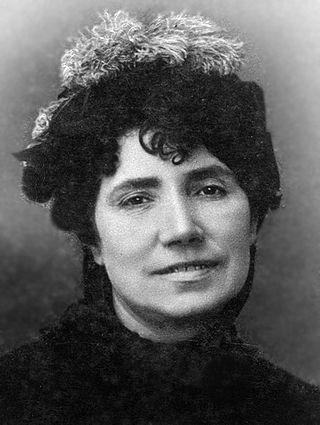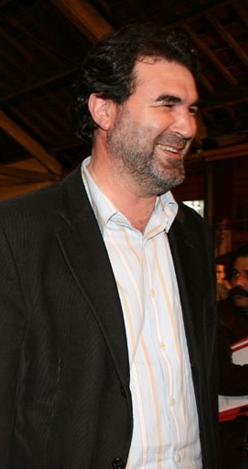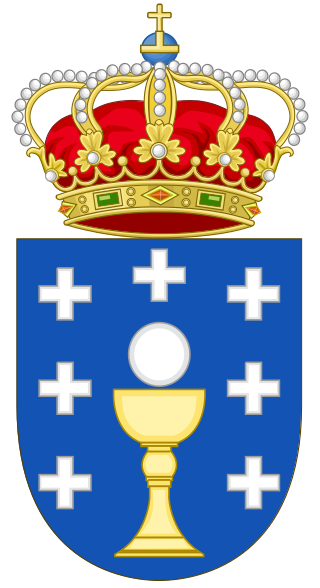
Galicia is an autonomous community of Spain and historic nationality under Spanish law. Located in the northwest Iberian Peninsula, it includes the provinces of A Coruña, Lugo, Ourense, and Pontevedra.

María Rosalía Rita de Castro, was a Galician poet and novelist, considered one of the most important figures of the 19th-century Spanish literature and modern lyricism. Widely regarded as the greatest Galician cultural icon, she was a leading figure in the emergence of the literary Galician language. Through her work, she projected multiple emotions, including the yearning for the celebration of Galician identity and culture, and female empowerment. She is credited with challenging the traditional female writer archetype.

San Cibrao, is an industrial and fishing town, part of Cervo in Northwestern Spain. The population of San Cibrao is about 3,000 in July and August and about 2,000 year-round.

The Council of Ministers is the main collective decision-making body of the Government of Spain, and it is exclusively composed of the Prime Minister, the deputy prime ministers and the ministers. Junior or deputy ministers such as the Secretaries of State are not members of the Council. The Monarch may also chair the Council when needed on the invitation of the Prime Minister.
The Xunta de Galicia is the collective decision-making body of the government of the autonomous community of Galicia, composed of the President, the Vice-President(s) and the specialized ministers (Conselleiros).

Anxo Manuel Quintana González, commonly known as Anxo Quintana, is the former leader of the Galician Nationalist Bloc, the main nationalist party in Galicia. From 2005 to 2009 he was a partner in the Galician Government, holding the positions of Vice-President and Minister for Social Affairs.

The Statute of Autonomy of Galicia of 1981 is the current basic institutional norm of Galicia. The Galician Government, Parliament and High Court of Galicia are regulated by it.

Elena Espinosa is a Spanish politician in the Spanish Socialist Workers' Party. She was the Spanish Minister of the Environment until 20 October 2010 when she was replaced by Rosa Aguilar. She currently represents Ourense in the Spanish Congress.
La Voz de Galicia is a Spanish daily newspaper owned by the Corporación Voz de Galicia. La Voz is highest circulation newspaper in Galicia and the eighth-highest circulation general-interest daily newspaper in Spain. It is written primarily in Spanish with Galician used in the cultural and opinion sections.

Carballo is a municipality in the province of A Coruña, in the autonomous community of Galicia, in northwestern Spain. The town is the thirteenth most populated municipality in the region and it belongs to the comarca of Bergantiños, serving as its capital.

José Rodríguez Carballo is a Spanish prelate of the Catholic Church who has served as Coadjutor Archbishop of Mérida-Badajoz since September 2023. He was secretary of the Dicastery for Institutes of Consecrated Life and Societies of Apostolic Life from 2013 to 2023 and minister general of the Order of Friars Minor from 2003 to 2013.

Alberto Núñez Feijóo is a Spanish People's Party politician who serves as Member of the Congress of Deputies and as president of the People's Party. He served as the President of the Autonomous Government of Galicia from 2009 to 2022. Feijóo was appointed government formateur following the 2023 election, however his investiture ultimately failed.

Carballo is originally a, surname. It is derived from both a Galician and Portuguese word meaning oak, referring to the family's settlement's surroundings of forest on mountainous terrain in A Coruña, Galicia, the northwestern part of Spain. Over the years, the surname has become more frequent in other countries, and the name has had variations in its spelling. It became widely renowned in the early 1600s in the Spanish colonization of the Americas or New Spain and greatly expanded during the 1800s. It spread from South America, Central America, Mexico, and North America, also including the Philippine Islands, Cuba, and Puerto Rico, territories of Spanish Colonialism or colonial expansion under the Crown of Castile during Spanish holdings in the Age of Discovery.

Ana María Pastor Julián is a Spanish doctor and politician for the People's Party who served as President of the Congress of Deputies from 19 July 2016 to 20 May 2019. Previously she was Minister of Health from 2002 to 2004 and Minister of Public Works from 2011 to 2016. Since 20 May 2019 is the Second Vice President of the Congress of Deputies.

Zhenis Makhmuduly Kassymbek is a Kazakh politician who is currently serving as the Äkım of Astana since December 2022.

The Spokesperson of the Government of Spain is a high ranking of the Government of Spain whose purpose is to inform and communicate to society the political and institutional action of the central government. Its headquarters is located in the denominated Complex of La Moncloa. Currently the holder of the position enjoys the rank of Minister.

The Spanish government departments, commonly known as Ministries, are the main bodies through which the Government of Spain exercise its executive authority. They are also the top level of the General State Administration. The ministerial departments and their organization are created by Royal Decree signed by the Monarch and the Prime Minister and all of them are headed by a Cabinet member called Minister.

The Institute of Youth (INJUVE) is an autonomous agency of the Government of Spain responsible for promoting youth associations and collaboration for their advancement; the development and coordination of an information and communication system for youth; the promotion of relations and international cooperation in youth affairs; as well as the cultural promotion of youth and knowledge of other cultural realities.

Liliana del Carmen La Rosa Huertas is a Peruvian nurse and academic specializing in public policy. She was Minister of Development and Social Inclusion of Peru from 2 April 2018 to 11 March 2019, during the government of Martín Vizcarra.

Mara Brawer is an Argentine psychologist and politician, currently serving as National Deputy elected in the Federal Capital since 2019. She had previously served in the same position from 2011 to 2015. A member of the Justicialist Party, Brawer sits in the Frente de Todos bloc.


















